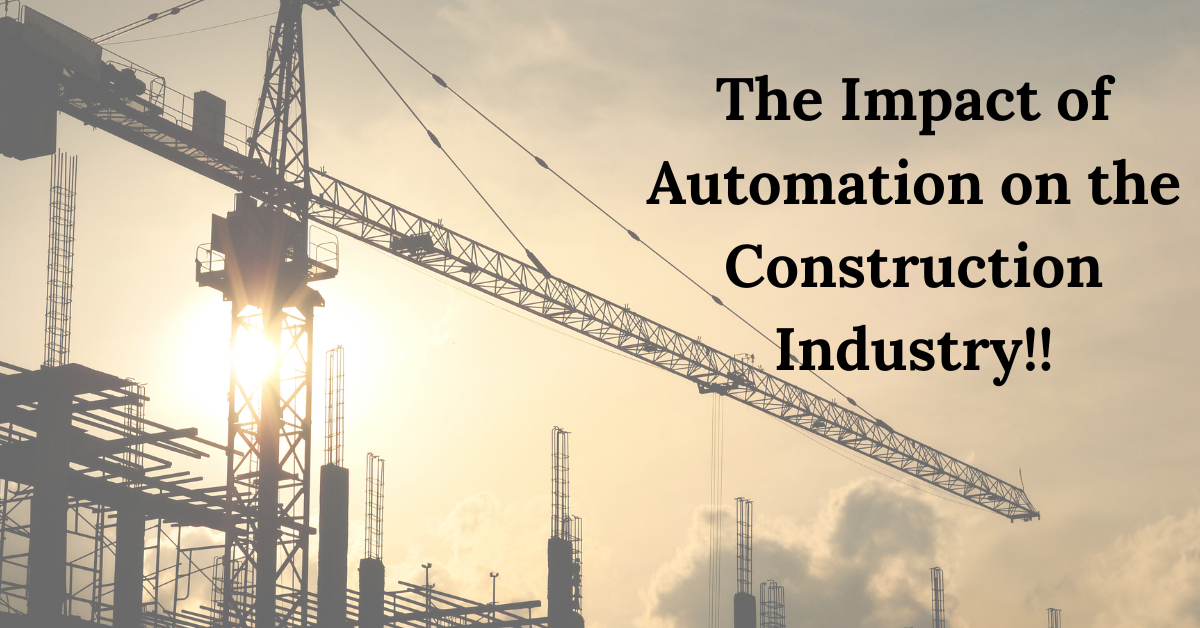The Impact of Automation on the Construction Industry

Have you ever wondered about the growing popularity of automation and its involvement in multiple industries? Well, in recent years, various industries have started adopting automation and growing using the privileges that automation offers.
From manufacturing to customer service automation has revolutionized the way industries work. However, the construction industry has historically been slow when it comes to adapting new technologies and construction methods have remained largely unchanged.
The struggle of the construction industry to adapt to automation and other new technologies might lead to agitation. But worry not!! Automation technology like robotics and AI offers a promising solution to the existing challenges.
Automation has the potential for the construction industry and offers sustainable and environmentally friendly construction practices. In this blog, we will explore the various emerging automation technologies in construction, the benefits of automation in this industry, and the challenges that might occur in this transition.
So, read this blog till the end to understand how just by embracing automation, the construction industry can position itself and use potential for growth and success in the upcoming years!
The Rise of Automation in the Construction Industry
Automation is using emerging technologies to perform tasks with minimal human intervention to avoid potential manual mistakes. Traditionally reliant on time-consuming processes, heavy machinery, paper-based documentation, and manual labor, the construction industry now has a great chance to embrace automation to enhance quality, efficiency, and safety.
The traditional methods have served well for centuries, but they also come with inherent limitations, such as inefficiencies, rising costs, and safety risks which can be eliminated using automation technologies.
Apart from this, as the demand for housing and infrastructure continues to grow, the construction industry is under continuous pressure to deliver products with higher quality, at a faster pace, and at cheaper rates. This has led to a growing interest in the automation technology that can help address these potential challenges. We will discuss this in detail later in this blog.
According to a report by McKinsey, the construction industry ecosystem has experienced an explosion of investment for a better future. An estimated $50 billion was invested in the construction industry, along with the architecture and engineering industry, between 2020 to 2022 which is 85% higher than the previous three years.
Potential Automation Technologies in the Construction Industry
Building Information Modelling (BIM)
Building Information Modelling (BIM) is a digital representation of a building, including its geometric and non-geometric properties. BIM helps in providing a central source of information for all project stakeholders for a better understanding of the architecture.
BIM can be used for multiple tasks such as designing, construction, planning, or facility management. Building Information Modelling also helps in identifying potential conflict in the early stage of the design process, which further helps in better planning, designing, and reducing waste.
Robotics
Robotics is one of the greatest emerging automation technologies that can help in doing manual tasks with great efficiency and precision. Robots are increasingly being deployed in construction tasks, offering greater efficiency and safety.
The following are the most prominent applications of robotics in the construction industry:
- Demolition: Demolition is a task, which includes the highest risk of injuries to human workers. So, to avoid this, robotic demolition machines can safely and efficiently break down huge structures, minimizing the safety risk.
- Welding: Robots are also being used in welding applications, especially in hazardous or repetitive tasks. Welding requires high precision, robotic welders have the potential to perform all the complex well with great precision, ensuring the quality of the final product.
- Masonry: Another area of construction, where robots are helping and playing a major role is in masonry tasks. Robotic muscles can perform tasks like laying bricks and lifting heavy blocks at a faster pace with better accuracy than human workers, which eventually leads to improved productivity and reduced waste.
Artificial Intelligence
Artificial intelligence is another technology that is starting to make its mark in all the major industries. In the construction industry, AI can help in two of the most major and helpful tasks, which include predictive analytics, and autonomous equipment.
Predictive analytics is used to identify potential risks and problems in the existing construction project. This helps the team to take proactive measures to mitigate those risks and make changes accordingly in their planning.
Auto equipment refers to machinery or tools that can operate independently without any direct human control. Such devices use artificial intelligence or sensors to perceive their environment and make decisions accordingly. So, self-driving heavy machinery like bulldozers and excavators can be used to automate heavy and repetitive tasks, improving safety and efficiency.
Drones and UAVs
Drones or unmanned aerial vehicles (UAVs) are a great emergent technology, which can help a lot in the construction industry. Drones can be used for a variety of tasks, including:
- Surveying: Drones can capture area images and create detailed maps of the construction sites using those images. This can be used as valuable data in planning the structures and creating the designs.
- Inspection: Drones can be used to inspect structures to identify damage, defects, or other potential problems before they become major and create further issues during the planning or designing phase.
- Delivery: Drones can also be used for delivery. Essential materials can be delivered to remote construction sites using drones as it reduces the need for human transportation and saves labor.
Benefits of Automation in the Construction Industry
Better Safety
Automation can help in having better safety at the construction site as using automation technologies, project teams can monitor or examine the entire construction site to check for potential hazards, such as gas leaks or structural instability. This will allow the team to take proactive measures to address such risks before any harm to anyone.
Automation can also help minimize the risk of injuries or accidents at the construction site as using automation reduces the need for human workers to perform difficult tasks, such as working at height or operating heavy machinery.
Increased Efficiency
Automation can significantly result in improved efficiency and productivity of various construction projects. Automating repetitive tasks, such as site preparation or material handling, helps the project teams save a lot of their time.
This helps the team in focusing on more complex projects or other planning of the existing project. Apart from this automation can also help in minimizing the downtime caused by manual errors and hence leads to faster project completion and reduced labor costs.
Enhanced Quality
Automation ensures the construction materials and other necessary components are used efficiently and in the right way. This eliminates unnecessary waste and improves the overall quality of the finished product.
Apart from this, automation helps in achieving consistent and precise results with better accuracy than human workers, reducing the risk of potential errors and defects.
Cost Savings
Automation provides sustainable and long-term financial benefits as by improving efficiency, quality, and productivity, automation helps in reducing the cost associated with materials, human labor, and repetition of tasks.
Automation can also help in finishing up the project on time or even before that which minimizes the delay. This can have a significant impact on project costs.
Common Challenges Faced in Adapting Automation
Skill Gap
The increasing need to use automation in the construction industry is leading to a high demand for workers with specialized skills. In order to use the technology and necessary automation tools, workers should have strong basics and understanding of the technology, such as robotics, or artificial intelligence.
However, it is difficult for workers to adapt to automation, considering they have been working using traditional methods for years. This is creating a skill gap that can be filled with necessary educational and training programs that can help the workers achieve the skills required in the automated construction industry.
Initial Investment
Adapting automation can result in huge spending of money initially and require a significant upfront investment as the cost of purchase and installation of automation equipment and cost of training the workers can be substantial.
In this situation, it is ideal to consider the long-term benefits of installing all the automation equipment, and over time the savings realized through automation can outweigh the initial investment as well.
Job Displacement
One of the major concerns about adapting automation is the potential for job displacement. As automation technologies emerge and become more advanced, there are chances that some jobs might become obsolete.
In this scenario, it is important to understand that automation is to help human workers instead of replacing them. Automating manual tasks which consume a lot of time can help the workers to focus on more complex tasks.
Apart from this, the introduction of new technologies will create new job opportunities related to the maintenance or operation of automation systems, which will reduce the chances of job displacement.
Data Security
Adapting automation comes with a large risk of data theft as automation systems usually generate a large amount of data which includes sensitive information, such as project plans or customer information.
It is extremely important to protect this data from cyber attacks or unauthorized access. To avoid this and maintain confidentiality and integrity of the data, construction companies must implement robust security measures such as regular security audits, encryption, and firewalls.
Conclusion
Automation refers to the use of emerging technologies to perform tasks with minimal human intervention to avoid manual errors. The potential benefits of automation in the construction industry can fairly outweigh the challenges that exist in it.
By embracing the power of automation, the construction industry can become more productive, efficient, and sustainable. In the process of adapting automation, there will undoubtedly be multiple challenges to overcome, however, the future of automation is capable enough to face all the challenges with the potential of automation.
From autonomous construction robots to AI-powered automation tools, the possibilities are endless and we can expect to see even more innovative applications in the construction industry.
So, take the first step towards a more efficient and profitable construction business and position your company for long-term success. You can also check our website to explore our services to learn better about the construction industry and stay informed about the latest developments in automation.




